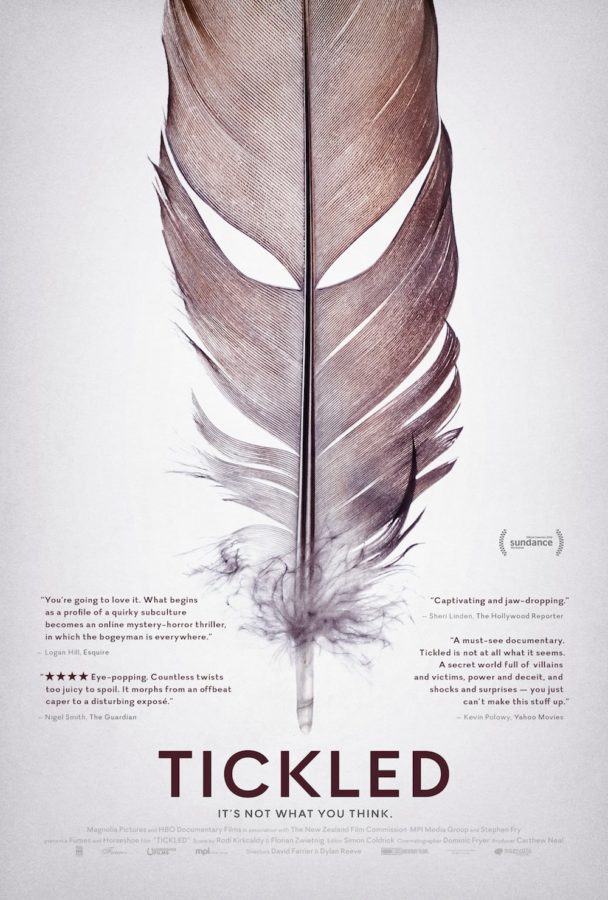‘Tickled’: journalistic integrity of docu-thriller
Rights belong to A Ticklish Tale
“Tickled” was released on June 17. 2016.
September 13, 2018
Warning: Spoilers ahead!
David Farrier, a New Zealand journalist, did not expect to find a dark underbelly of deceit and crime hiding in the world of “competitive endurance tickling” videos he stumbled upon.
Shockingly, however, the story unwound itself to reveal darkness at every turn. In 2016, Farrier and TV producer Dylan Reeve released their documentary, “Tickled,” which chronicles the investigation into this seemingly innocent culture of videos. It is quite possibly one of the most intriguing, courageous acts of investigative journalism in recent years and deserves more recognition for such.
Farrier makes a living by spotlighting the bizarre and quirky; naturally, when he came across this strange sport of “competitive endurance tickling,” he was fascinated. The videos were of young guys tickling each other into laughing fits. Though slightly disturbing, Farrier believed it to be an amusing story that would entertain readers. Little did he know of how massive this narrative would become. After emailing Jane O’Brien Media, the company producing these videos, and attempting contact through Facebook, Farrier received numerous responses with derogatory remarks, strongly suggesting that he not look further into the tickling.

Quickly, the once-goofy topic reared its ugly head. Farrier, along with his colleague Reeve, decided to press in despite the various legal and physical threats made against themselves. The wormhole they entered into revealed that Jane O’Brien Media was preying on young boys, often underage, and paying them in large quanitities of money and goods, sometimes including cars. Then, as soon as the kids depended on the tickling as a main source of income or if they elected to cut ties, the company released their information on the internet and harrassed them with phone calls and emails. And that is just the beginning.
David D’Amato, who lived off trust fund money, was able to control an empire of tickling from his penthouse apartment. Apparently, while enjoying the power trip he got from taking the reigns over someone’s life and learning disturbing amounts of personal information about all the boys that appeared in his videos, D’Amato ruined future prospects for employment and harrassed those who formerly participated in the tickling with mail, emails and voicemails laced with personal attacks.
Farrier and Reeve persisted in their investigation of “competitive endurance tickling” in order to expose the tricks of an old, hurtful man. Following the movie, the pair have been outspoken about the importance of utilizing one’s voice, especially in the era of fake news, a topic that remains pertinent to them as Jane O’Brien Media continues to pursue legal action against the two.
David D’Amato’s death sent waves through the community of viewers who had seen the documentary. Farrier and Reeve have released multiple statements on the impact of his death, one responding to the conspiracies surrounding continuation of Jane O’Brien post-D’Amato, another as a statement about D’Amato’s passing.
“Ultimately we’ll never know all the things that made David the man he was,” wrote Farrier and Reeve in the statement. “Like all of us, he was complex and complicated. So we ask you to keep in mind that while David appears to have lived a fairly solitary life, he did have friends and family members.”
The importance of “Tickled” as a documentary is the topics of journalism, truth and the power of money that it explores. Throughout the film, Farrier and Reeve express their concern not only about certain confrontational situations in order to produce quality content, but their security. While it may seem too ridiculous to be real, the film is essentially a true-crime documentary.
As the documentary enters its conclusion, Farrier offers his final remarks about what “competitive endurance tickling” truly brings about.
“I now think that this was never even about tickling,” said Farrier. “This is about power, control and harassment; about one person’s twistedness and how far that can go; one person who’s managed to shelter himself with money to keep his obsession going. But now it’s his life exposed.”










David Starr • Sep 14, 2018 at 1:29 am
Just to let you know, the lawsuit was against five of us who worked on the film, myself included.